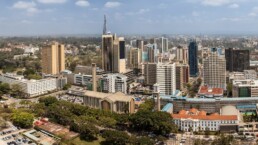Share
Infrastructure in Africa: Turning Investment to Impact
The case for infrastructure investment is well understood across Africa, but so is the broad consensus that investment in African infrastructure per capita has not progressed at the rate required. Some even suggest that the situation has deteriorated. Recent estimates by the African Development Bank (AfDB) suggest that the continent’s infrastructure needs now amount to $130–170 billion a year, with a financing gap in the range $68–$108 billion. Those figures are far higher than previous estimates of $93 billion in annual needs, with a financing gap of $31 billion published by the World Bank.
Many reasons for this phenomenon have emerged in recent years, with most potential solutions centered around how we might attract the vast sums of the global private capital to the ‘self-evidently’ bountiful opportunities offered by Africa’s growth. However, this is not primarily a challenge of investment input. McKinsey reported that between 2013 and 2017, the average annual funding for infrastructure development in Africa was $77bn – double the annual average in the first six years of the century. Whilst there remains an investment deficit, it’s becoming clear that most Africans are not feeling the full benefits of the existing investments. A report published by the World Bank suggests that more people on the continent are poor today than in 1990. “Paradoxically, citizens in resource-rich countries have worse outcomes in human welfare indicators. This underscores that whilst economic growth is critical for poverty reduction, it is not sufficient.”
Role of the Public and Private Sectors
Although there is much to unpack in the World Bank’s report, the decoupling of headline economic growth and localised poverty reduction is crucial, as is the spotlight on ‘outcomes in human welfare’. In the context of infrastructure, inputs are the elements of planning, investment, and design that are required. The output is the new asset once completed, but the outcomes are the benefits (or disbenefits) that accrue to the population affected directly or indirectly by the asset. Input does not, by itself, guarantee its intended outcomes – the responsibility for which should remain the core responsibility of central public policy.
Attracting investment is one thing but channeling the investment in the most useful context that maximises the outcomes for a given population is a separate challenge. This can only be achieved with visionary and proactive policy making by accountable governments at all levels, particularly the central government. Using Nigeria as the primary case in point, this article argues that whilst private capital is welcome and necessary, infrastructure development remains a critical public policy tool to be leveraged strategically and deliberately by the government. Maximizing the benefits of infrastructure is the responsibility of a representative government; the role of private capital should be in the implementation of a clear and long-term cross-sector strategy, steered from central government.
Nigeria needs investment in its infrastructure. What it needs even more, however, is a clear, strategic and holistic plan for infrastructure across the nation, developed and driven by the central government to meet the needs of its people. The inadequate progress of infrastructure development in Nigeria – and perhaps on the continent more generally – has been misdiagnosed as an investment deficit. Instead, the strategic case for infrastructure must be expanded to include the social, political and diplomatic wellbeing of the nation.
In the hands of a progressive government administration, a comprehensive and purpose-driven infrastructure policy can deliver wider economic benefits, and an inclusive, balanced economy. Further, an outward-looking infrastructure agenda can be an effective tool in a wider suite of long-term foreign policy objectives.
Delivering wider economic benefits
Economic infrastructure plays a vital role in moving people around the country, powering enterprises, connecting citizens and helping to drive growth. Each piece of infrastructure should form part of an interdependent system of networks within the wider economy, with the potential to generate broader benefits beyond simply performing its function. Realising these broader benefits on the most complex projects can be difficult, but the literature suggests that a characteristic of ‘failed’ infrastructure projects is the lack of clearly articulated value and benefit in the first place (Flyvbjerg, 2007) – especially those outside of the asset’s core function. For example, the core function of a new rail line or road could be to reduce passenger travel times from point A to point B by [x] minutes, but the wider benefits include bringing trade, housing and prosperity to the region – altogether delivering more than just a transport connection.
It’s unlikely that providing pieces of infrastructure alone will bring these wider benefits, as the right circumstances need to be present. In order to drive economic growth, infrastructure needs to be part of an effective, joined up and complete economic strategy. Realising such wider benefits is therefore a crosscutting delivery challenge that requires complimentary action and cooperation from a variety of players, and it is often the central government whose role it is to bring cohesion. For example, boosting housing will require investment in additional utilities and social infrastructure like schools as well as providing ‘last mile’ local transport. Unlocking housing will also be dependent on the planning system and as a result will need to engage with local governments. An ambition to spur extra growth and job creation would mean engaging with local businesses to understand how economic infrastructure investments fit their needs. Few of these wider benefits will be achieved if left entirely to the private sector.
Re-balancing the Economy
A further reason for infrastructure to be a core responsibility of the central government is the opportunity to deliver a balanced economy across multiple sectors, but perhaps more crucially, across its geography. A great destabilising factor of the Nigerian state for example, is the perceived imbalances in the fortunes of the different regions of the country. As a case in point, research shows that the average Christian household in the south of Nigeria has about 1.5 times the amenities the number of amenities available to the average Muslim household in the north. This maps onto the data on the Kingmakers’ website, which ranks the living standard and economic performance of the various states across Nigeria; whilst the picture is sometimes noisy, populations in southern states like Ogun, Osun and Lagos tend to have greater economic security than northern states like Sokoto, Bauchi and Kano. These disparities have been the source of ongoing social and political tensions, and the country is likely to remain divided unless a rebalancing takes place.
Infrastructure can be an effective rebalancing tool as wealth and commerce are redistributed through trading and travel routes. Living and working across state-lines and regions is common-place outside the continent, but almost impossible in Nigeria due to poor or unreliable connecting infrastructure. This is difficult to reverse and is in fact exacerbated by private investment because the return on investment (ROI) for network infrastructure will always be more attractive in already densely populated areas, leaving rural populations cut further adrift. Only the central government can end the vicious cycle by deliberately targeting investment in those underserved areas, connecting them to dynamic economies and providing access to the national wealth. Shared wealth and natural resources over time should bring greater cohesion to the people of Nigeria, a remit that is naturally beyond the influence of a private actor.
Infrastructure as a Foreign Policy tool
Foreign investors have long been awake to the opportunity of investment in Africa either for its people or for its immense resources. Infrastructure investments made by foreign actors sometimes operate at a distance from the interest of the local population. Through multilateral institutions like the IMF and the World Bank, western values of transparency, rule of law, human rights – and other vehicles of soft power – were ostensibly introduced to the continent. However, some African states are now turning away from western donors and international organisations, opening the door for alternative investments from Russia, China and multilaterals like the Asian Infrastructure Investment Bank (AIIB). This trend is likely to have consequences for the future balance of international power. African States, including Nigeria, can use this leverage to their diplomatic and domestic advantage rather than being a passive recipient. For example, Nigeria could use these negotiations to knowledge transfer agreements and exchange for their commodities. Even better, the African Union as a whole might try to secure diplomatic arrangements with the EU, the US or China for the benefit of the continent.
The opportunity is heightened in economies dependent on extractives – as is disproportionately so across Africa – and the case of Nigeria offers up the Niger-Delta region as a case study. The country although known for its vast oil reserves, with an estimated 37bn barrels of proven oil reserves, approximately 2.2% of the world’s total reserves, has long relied on international actors to extract, refine and utilise the commodity. Without proper oversight, the plight of the Niger-Delta has been well documented with no clear path to resolution; with the decimation of livelihoods, marine life and agricultural posterity, projects that put profits ahead of the people and the planet have become commonplace. Nigeria has a chance to reframe the terms of engagement according to its own benefits, and the needs of its people. The same is true for foreign investments into the airports, road networks and utilities; the financing – either public or private – is not enough, it must come with coherent and progressive policymaking.
The views expressed in this article are those of the author alone and not the Future Africa Forum.
The views expressed in this article are those of the author and do not necessarily reflect the views of Future Africa Forum. Future Africa Forum is a pan-African policy think-tank and policy advisory consultancy headquartered in Nairobi, Kenya.



